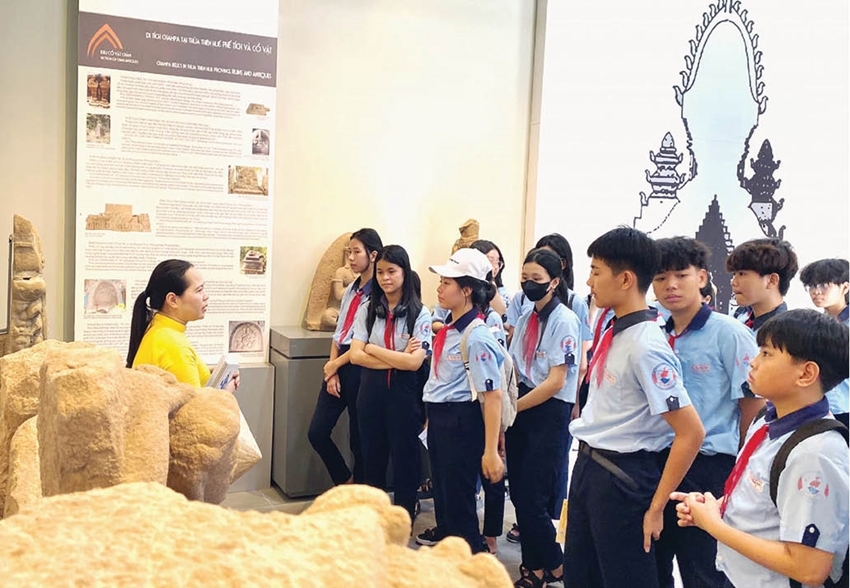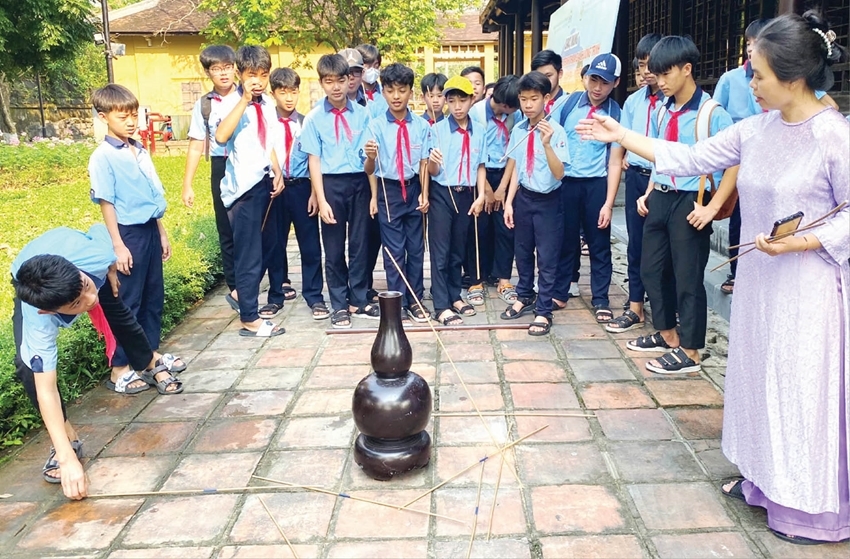 |
| Educating about heritage through field trips ignites excitement for students |
As a part of Hue Monuments Conservation Center, over the past time, aside from scientific research, display, exhibit, and welcoming guests, Hue Museum of Royal Antiquities has been emphasizing conservation efforts and promoting the values of heritage and culture through “Heritage Education - Culture – Art” program for young generations, especially students and pupils.
Mr. Ngo Van Minh, Deputy Director in Charge of HMRA, shared: From October 2023 to April 2024, at two locations - Hue Museum of Royal Antiquities (3 Le Truc Street) and An Dinh Palace Relic (179B Phan Dinh Phung Street), the museum has organized 51 heritage education programs for 4,783 pupils from primary and secondary schools across the province; welcoming, guiding, and presenting HE to over 3,000 students, from high school to college, including high-quality educational institutions within and outside the province, through the subject of “Local Education”.
Participating in the experiential program, Bao Han, a student from Hai Ba Trung High School, excitedly shared: “Seeing, hearing ancient relics and learning about architectural structures and historical-cultural values have helped us understand more about our world-recognized heritage and love our homeland even more.”
In the heritage education programs organized by the museum, students not only listen to and learn about the material life, rituals, politics, and ideals of the Nguyen dynasty's nobles and royals in particular and the history and cultural identity of Hue in general. They also have the opportunity to enhance their historical and cultural knowledge in the most intuitive and vivid way.
 |
| Students participating in ancient royal games with excitement |
To suit each age group of students, the museum has researched and developed rich and diverse explanation and instruction content, closely following the curriculum of history, literature, art, and technology subjects at each specific time.
“With the motto of ‘learning while playing, playing while learning’, we always focus on enriching the experiential content by combining games to increase the attractiveness and excitement of each program. Notable are the royal court games such as “Xăm hường,” “Bài vụ,” and “Đầu hồ”, which were the games and pastimes of the nobles in ancient times, considered the “specialties” and brand image of Hue Museum of Royal Antiquities,” said Mr. Truong Quy Man, Deputy Director of the HMRA.
The museum has also researched, supplemented, innovated, and applied more educational games such as “Heritage Q&A” or “Relay.” These are forms of testing the content and knowledge that have been provided to the students during the explanation and guidance. These games have helped increase interaction; train listening, looking, reading, and writing skills; enhance teamwork skills; improve solidarity; and, above all, create excitement and fun and give students moments of rest and relaxation after school hours, arousing in them a passion and interest in antiques, relics, and heritage in particular and pride and love for their homeland and country in general.
According to Mr. Ngo Van Minh, in the future, the museum will further strengthen its close connection with schools to develop more suitable and attractive programs. Not only providing information unilaterally - what the museum has, but based on what students need. Additionally, the museum will research and add more creative games suitable for each age group, ensuring the criteria of “learning while playing,” encompassing the goals of heritage education, to make the programs organized by the museum more appealing to students. In the near future, HMRA will complete the heritage education documentation set, contributing to standardizing the content based on practical criteria and requirements of the program organization process, thereby ensuring tangible effectiveness for school-based heritage education initiatives.